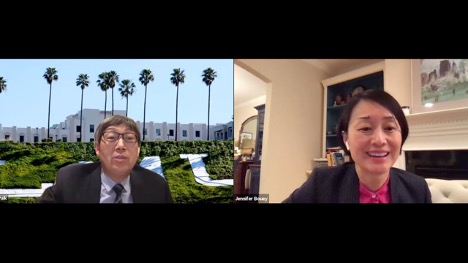
On April 30, 2020, the Center for Asian Business D.K. Kim Lecture Series, in collaboration with the Center for International Business Education, presented a special webinar titled “Facts and Myths about the Coronavirus and Economic Recovery Strategies.” Dr. Yongsun Paik, director of the Center for International Business Education and Center for Asian Business, moderated a fireside chat with featured speaker Jennifer Bouey, MD, Ph.D., a senior policy researcher and the Tang Chair for China Policy Studies at the RAND Corporation. Dr. Bouey shared her knowledge and insights on the COVID-19 pandemic with the LMU community and participants worldwide.
According to the World Health Organization (WHO), COVID-19 was first identified in December 2019 in the Wuhan province of China. By mid-January, the first recorded cases outside of China were reported in Japan and Thailand; the first confirmed cases in South Korea and the United States were reported on the same day. Shortly thereafter, the WHO declared a global health emergency. The effects of the COVID-19 pandemic have been continuous and far-reaching including over four million cases worldwide amid widespread economic disruption, including disruption of the global supply chain.
Dr. Bouey’s work has included leading an international research workgroup on U.S. and China’s health security interests, pandemic preparedness, and global health governance. As an epidemiologist and expert on China Policy Studies, Dr. Bouey presented a unique and timely perspective on the effects the pandemic has on public health and the economy. At the outset, Dr. Bouey remarked how unusual it is for an epidemiologist to be speaking at a business school, then said, “But this is a different time.”
Observing that the economy is a global phenomenon based on market demands and the supply chain, Dr. Bouey said, “We have to form a coalition to fight the epidemic first. If we have some countries doing well, but not other countries, we still cannot [save our economy].”
Dr. Bouey explained how COVID-19 is different from other health epidemics such as SARS and MERS; it is more contagious and spreads quicker than other diseases. She also discussed policies that will effectively mitigate the damage of the pandemic, its challenges, and the impact on the global economy and supply chain. She presented the TEA (Transparency, Efficient, and Agility) model as an approach to effectively contain the crisis and begin healing the economy. According to Dr. Bouey, significant criteria for reopening the economy include continuing to wear face masks, social distancing and hand hygiene. “These will be the new norms,” said Dr. Bouey. “These new norms, at least, will allow the economy to continue.”
Reflecting on the webinar, Dr. Paik said, “We are at war against the coronavirus pandemic. So many people have died from COVID-19 and lost their jobs around the world.” Dr. Paik shared the significance of bringing in an expert who is well-versed not only in health but also in economic issues as these two problems are inseparable.
“I think Dr. Bouey, as an epidemiologist, was excellent in educating us about this deadly disease and assessing its impacts on the global economy, and global supply chain in particular.”
To view the webinar, please visit the LMU CIBE website.



